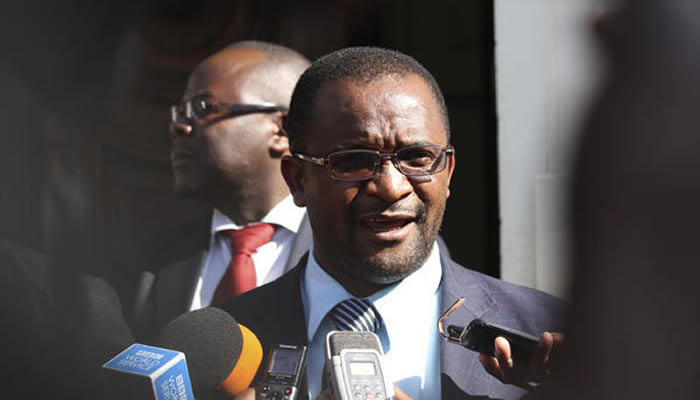The Constitutional Court (ConCourt) has ruled that the 2009 arrest of Movement for Democratic Change (MDC-T) secretary general, Douglas Mwonzora, on allegations of insulting President Robert Mugabe was a violation of his fundamental rights.

The full nine-member ConCourt bench headed by outgoing Chief Justice, Godfrey Chidyausiku, ruled that it was wrong for Mwonzora — a former legislator for Nyanga North — to be prosecuted for expressing his views at a political rally.
“It is declared that the prosecution of the applicant on allegations of having contravened Section 33(2)(a) of the Criminal Law (Codification and Reform) Act (Chapter 9:23) amounted to a deprivation of his personal liberty save as would have been authorised by law in contravention of Section 13(1) of the Constitution and was a denial of the fundamental right of the applicant to the protection of the law guaranteed under Section 18(1) of the Constitution,” said Deputy Chief Justice, Luke Malaba, in a ruling which all members of the ConCourt bench concurred with.
“The finding by the court is that if the facts alleged in the outline of the case for the prosecution were proved at the trial of the applicant they would not have constituted an offence.”
The case, which started in 2015, was finalised on November 23, and the full written judgment was made available this week.
Mwonzora was accused of undermining the Office of the President by calling President Mugabe a goblin among other things at an MDC-T rally held at Ruwangwe Growth Point in Nyanga in 2009.
When the trial started, Mwonzora, a lawyer by profession, took the matter the to ConCourt, challenging various aspects of the charges laid against him.
The ConCourt ruled that the State did not fully understand what constituted a crime of undermining the Office of the President in terms of the Criminal Law (Codification and Reform) Act.
“The prohibited statement must be about or concern the President or his office. The slogan exalting the MDC-T political party and the statement on corruption in government could not have been about or concerning the President. They could not be described as false statements either. The sarcasm in the conveyance of the message may have offended some of the listeners. It did not, however, make the message itself false. It was necessary for the State to indicate the false statements uttered by the applicant because it was required to state facts that would prove that the applicant had knowledge of the falsity of the statements.
“The statement that the President was a goblin was obviously a false statement. The offence is, however, not committed because a person has uttered at a public place a false statement about or concerning the President. The statement must be accompanied at the time of its utterance by the knowledge of its falsity and an intention to use it to engender feelings of hostility in the audience against the President. That is not even enough for the offence to be committed. The State must prove beyond reasonable doubt that the false statement about or concerning the President was capable of deceiving the hearer into believing it is true and that it was likely to arouse in the audience feelings of hostility towards the President or his office.” Financial Gazette






